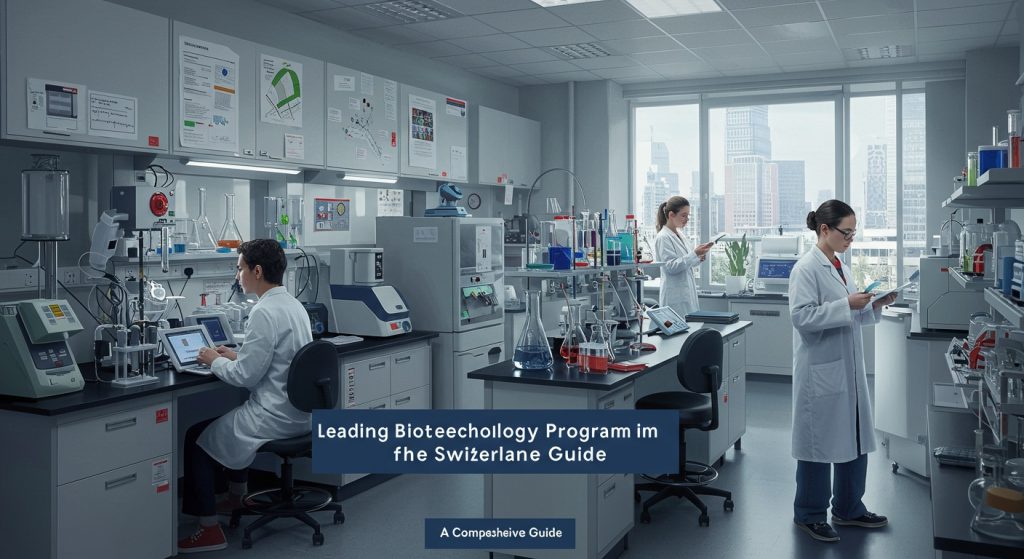Introduction
Imagine a world where personalized medicine isn’t science fiction. A readily available reality. A world where debilitating diseases are tackled at their genetic root, offering hope and extended life. This isn’t a distant dream. A future rapidly unfolding thanks to groundbreaking advancements in biotechnology. Switzerland, with its rich history of innovation and precision, stands at the forefront of this revolution. This guide dives into the heart of Switzerland’s leading biotechnology programs, offering a roadmap for navigating this complex and exciting landscape. Discover the institutions, research initiatives. Collaborative ecosystems propelling us toward a healthier and more sustainable tomorrow. Join us as we explore the future of biotech, made in Switzerland.
Switzerland: A Biotech Powerhouse
An Overview of Biotechnology in Switzerland
Switzerland’s robust economy, coupled with its strong focus on research and development, has created a thriving biotech ecosystem. The nation boasts a high concentration of pharmaceutical and biotech companies, academic institutions dedicated to cutting-edge research. A supportive regulatory environment. This combination makes Switzerland an attractive destination for both aspiring biotechnologists and seasoned professionals. Think of it as a fertile ground where scientific innovation blossoms.
Key Institutions and Their Strengths
Switzerland is home to several world-renowned institutions offering exceptional biotechnology programs. The Swiss Federal Institutes of Technology (ETH Zurich and EPFL Lausanne) are consistently ranked among the top universities globally, known for their rigorous academic standards and groundbreaking research. The University of Basel, with its strong focus on life sciences. The University of Zurich, known for its medical school, also offer excellent biotechnology-related programs. These institutions often collaborate with industry partners, offering students valuable real-world experience.
Specialized Programs and Cutting-Edge Research
Swiss biotechnology programs offer diverse specializations, from bioinformatics and drug discovery to bioprocessing and synthetic biology. Students can delve into areas like personalized medicine, immunology. Neuroscience, benefiting from state-of-the-art facilities and expert faculty. For instance, EPFL offers a Master’s in Life Sciences Engineering with specializations in bioengineering and neuroengineering.
Career Pathways and Industry Connections
Graduates of Swiss biotechnology programs are highly sought after by pharmaceutical companies, biotech startups, research institutions. Regulatory agencies. Switzerland’s strong industry presence provides ample internship and job opportunities, allowing graduates to launch successful careers in various sectors. Many find themselves contributing to groundbreaking research, developing innovative therapies, or leading teams in cutting-edge biotech ventures.
Navigating the Application Process
Admission to Swiss biotechnology programs is competitive. Requirements typically include a strong academic record in a relevant field (e. G. , biology, chemistry, or biochemistry), letters of recommendation. A statement of purpose. Proficiency in English is often required, as many programs are taught in English. Some programs may also require entrance exams or interviews.
Funding Your Biotech Future
Scholarship Opportunities and Financial Aid
Several scholarship opportunities and financial aid options are available for international students pursuing biotechnology studies in Switzerland. The Swiss government, as well as individual universities, offer scholarships based on merit and financial need. It’s essential to research and apply for these opportunities well in advance.
Cost of Living and Budgeting
Switzerland has a high cost of living, particularly in cities like Zurich and Geneva. Students should budget for tuition fees, accommodation, food, transportation. Other living expenses. Part-time work opportunities may be available. It’s crucial to grasp visa regulations and limitations on working hours.
// Pro Tip: Start your application process early and explore various funding options. Networking with current students or alumni can provide valuable insights into program specifics and career paths.
Future Trends and Innovations
Personalized Medicine and Data-Driven Healthcare
Switzerland is at the forefront of personalized medicine and data-driven healthcare. Biotechnology programs are incorporating these advancements into their curricula, equipping students with the skills to assess complex biological data and develop tailored therapies. This focus on individualized treatments is revolutionizing healthcare and creating exciting new career paths.
Synthetic Biology and Bioengineering
Synthetic biology and bioengineering are rapidly evolving fields with immense potential. Swiss institutions are investing heavily in these areas, developing innovative technologies and applications. Students interested in these fields will find ample opportunities to engage in cutting-edge research and contribute to advancements with far-reaching implications. For those interested in related fields, exploring programs in Germany may be of interest. You can find insights on top German biotech universities here: Top Universities in Germany for Biotechnology Innovation.
// Pro Tip: Consider attending webinars or conferences related to your area of interest to stay updated on the latest trends and connect with industry professionals.
Conclusion
Switzerland’s biotech landscape offers a potent mix of academic excellence, innovative research. Industry collaboration. From ETH Zurich’s pioneering work in synthetic biology to the vibrant startup scene in Basel, the opportunities are vast. Remember, networking is key: attend conferences like the BioValley Life Sciences Week to connect with industry leaders and potential collaborators. Key takeaways for navigating this dynamic ecosystem include leveraging personalized mentorship programs, understanding Swiss regulatory pathways. Securing early-stage funding through initiatives like the Swiss Innovation Agency (Innosuisse). Focus on developing strong multilingual communication skills – a significant advantage in this international hub. Embrace the collaborative spirit, stay updated on emerging trends like personalized medicine and biomanufacturing 4. 0. Consider specialized programs like those offered at the University of Basel’s Biozentrum. By capitalizing on these resources and remaining adaptable, you can carve a successful path in Switzerland’s thriving biotechnology sector. The future of biotech is being written here – be a part of it.
FAQs

